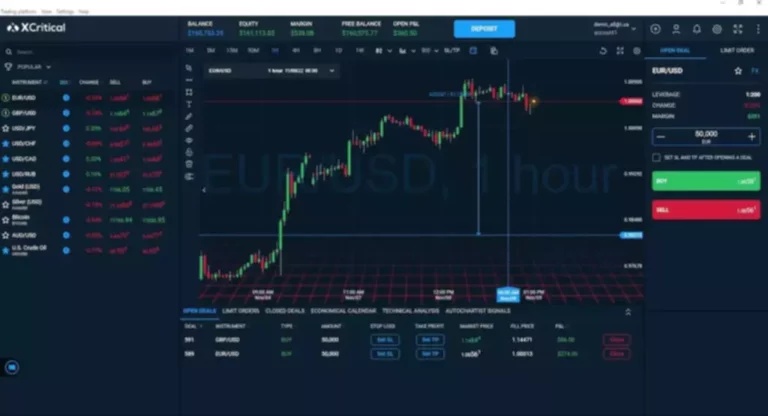Content
Zengo is revolutionizing the concept of crypto wallets with its Fintech keyless design, which eliminates the traditional and often cumbersome process of private key management. Instead of relying on a single point of failure, Zengo uses mathematical secret sharing to secure your assets. This means that even if you lose your phone, your assets are safe and can be easily recovered.
Grants and study groups – governments across the world invest in blockchain
Due to this, storage-only wallets are of most interest to individuals and companies that put the safety of the possessed assets over the frequency of transactions. These storage-only MPCs https://www.xcritical.com/ are best suited for businesses and organizations that are working to manage huge transactions securely. MPC wallets help custodial services and exchanges improve their security by distributing and preventing single points of failure for user assets’ private keys. Multiple stakeholders work together to administer the digital wallet and approve transactions, which makes MPC wallets an effective tool for secure cooperation and decision-making. DeFi development companies, organizations, businesses, and project teams that require an effective and safe method of managing assets.
What is Multi-Party Computation (MPC) Wallet? 2025 Guide
For more precise information on the above information, visit their official website or speak to an expert. When the user attempts to open a deal or order through other commands, a signature is created in the MPC protocol that vouches for and verifies the involvement of all other users. In another event, if mpc crypto the signature is illegal, then the command is unauthorized, which makes the user appear suspicious. As MPC is still evolving, it is also important to make sure that the implementation is up to speed with the latest features. These include key rotation, which moves material between MPC nodes to make the protocol a moving target, making it extremely unlikely that a malicious actor could steal all the key shards.
- MPC Wallet development entails the creation of wallets that utilize this advanced technology to ensure optimal security and operational flexibility for the management of digital assets.
- It enables cross-chain liquidity and supports over 20 blockchain protocols, allowing users to transfer assets across different blockchains without intermediaries or fees.
- Configuration of this kind offers users the possibility to use server capabilities for performing transactions while still being in control of their private key shares.
- But existing market solution are either tailored for institutional level clients, or are lacking in features.
- With the integration of all these characteristics, MPC Wallet-as-a-Service (WaaS) becomes a necessity for modern organizations to achieve full management of their cryptocurrencies.
- MPC wallets will eventually become the gold standard of crypto custody, offering the highest degree of security and privacy while remaining flexible and intuitive for retail and institutional clients to use.
- Krayon has demonstrated its worthiness as the MPC wallet solution of choice for startups, small teams, exchanges, and enterprises, given the variety of its aplications in the field.
How do MPC Wallets Ensure Security?
In doing so, it eliminates the persistent security threats from external and internal threat actors, particularly for organizations that manage and transact with digital assets on non-custodial wallets. Here are four use-cases on why Krayon is the perfect solution for comapnies wishing to securely manage their organization’s digital assets using industry-leading cryptographic technology that goes beyond what multisig wallets have to offer. With MPC wallet-as-a-service (WaaS), digital asset management is taken to the next level by providing unrestricted functionalities to the enterprise world with an improved mix of expertise, security, innovation, and user convenience. OKX Wallet is a non-custodial digital asset management solution that offers a plethora of features designed for advanced users. It serves as an extension of the OKX exchange, one of the world’s leading cryptocurrency exchanges, providing a seamless experience for trading and asset management.
As the cryptocurrency landscape continues to evolve, it’s crucial to stay informed about the latest innovations and technologies. MPC wallets represent one such innovation, providing users with a secure and decentralized solution for managing their crypto assets. By understanding the benefits, risks, and available options, you can make an informed decision when selecting the right MPC wallet for your specific needs. Look for features such as buying and selling crypto with fiat, biometric authentication, granular access controls, and compatibility with your preferred cryptocurrencies.
By leveraging MPC technology, MPC wallets offer enhanced security, flexibility, and control for the web3 wallet experience, enabling a better user experience than traditional wallets. Throughout the process, the private key shares are never exposed, and the parties cannot access each other’s shares. This ensures that even if an attacker compromises one party, they cannot gain full control over the wallet or the assets. By leveraging MPC technology, MPC wallets offer a secure and efficient way of managing digital assets.

This content is purely for educational purposes and should not be considered as financial advice. Do your own research before investing in any crypto platform and only invest the amount you can afford to lose. This blog will cover a brief introduction to what is an MPC wallet, why you need it, and How does MPC Wallet works.

MPC wallets also provide high accuracy for different computations using cryptography. This means they can perform complex operations such as generating addresses, signing transactions and verifying signatures without errors or inconsistencies. Dive into the world of multi-party computation (MPC) wallets, understand how they work, their benefits, risks, top options, and how to choose the right one for secure crypto storage.
It’s a smart contract wallet that uses Multi-Party Computation technology to securely manage digital assets on the blockchain. Unlike traditional wallets, MPC wallets use advanced cryptography to ensure the private key is never exposed or stored in one location, adding an extra layer of security. In the rapidly evolving world of cryptocurrencies, the security of digital assets remains paramount. As cyber threats become more sophisticated, the need for robust and secure wallet solutions intensifies. MPC wallets, with their advanced cryptographic techniques, have emerged as a frontrunner in this race, offering users a blend of security and usability.
Each party holds a share of the private key, which they use to compute their individual signature shares. It offers three-factor authentication, combining biometrics, your device, and the Zengo server to ensure that only you can access your wallet. This system helps users easily identify the nature of each transaction, adding an extra layer of security and user-friendliness.
MPC Wallet development entails the creation of wallets that utilize this advanced technology to ensure optimal security and operational flexibility for the management of digital assets. Such wallets are especially advantageous for enterprises engaged in large-scale cryptocurrency transactions or those necessitating institutional-grade security. Qredo is an innovative MPC wallet platform specifically targeting institutional investors. It enables cross-chain liquidity and supports over 20 blockchain protocols, allowing users to transfer assets across different blockchains without intermediaries or fees. With advanced security features like decentralized governance and atomic settlement, Qredo offers a unique solution in the MPC wallet landscape. The idea of a single private key is abolished, where, in MPC technology, it is never gathered, such that there is no single point of compromise possible for the private key.
Unlike multisig wallets, MPC wallets are supported on a larger number of EVM-enabled blockchains, offering institutions infinitely greater flexibility to manage digital assets on different chains – and interact with them securely and privately. Multisig wallets, on the other hand, lack the operational flexibility that is a prerequisite for institutional and organizational growth. In an MPC wallet, the private keys which users require to access and manage their crypto assets are split into multiple parts known as “shares”. Moreover, transactions can be authorized by attaining a required threshold of shares instead of requiring all or none of the shares.
MPC wallets enable scalability by allowing users to add or remove parties from the MPC protocol without affecting functionality. Users can adjust their security and performance levels according to their needs and preferences, providing flexibility for future growth. MPC wallets protect users’ data privacy by ensuring that no private information or secret data is revealed to each other or any third party. This ensures that no one can access or tamper with the users’ data without their consent or knowledge.
Errors or vulnerabilities in the code or protocol can compromise the security or functionality of the wallet, highlighting the need for expertise in this area. Every blockchain protocol has its own distinct private key implementation for multisig, making it hard for Gnosis to provide ongoing, stable support for new blockchains. MPC wallets offer keyless security by eliminating the need for a single private key, reducing the risk of theft. MPC wallets rely on advanced cryptographic techniques and distributed computing that are hard to understand and implement correctly.
